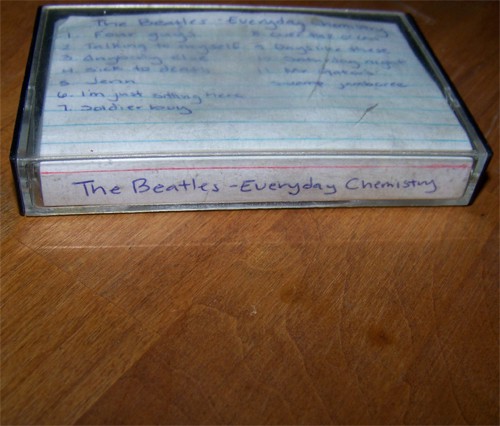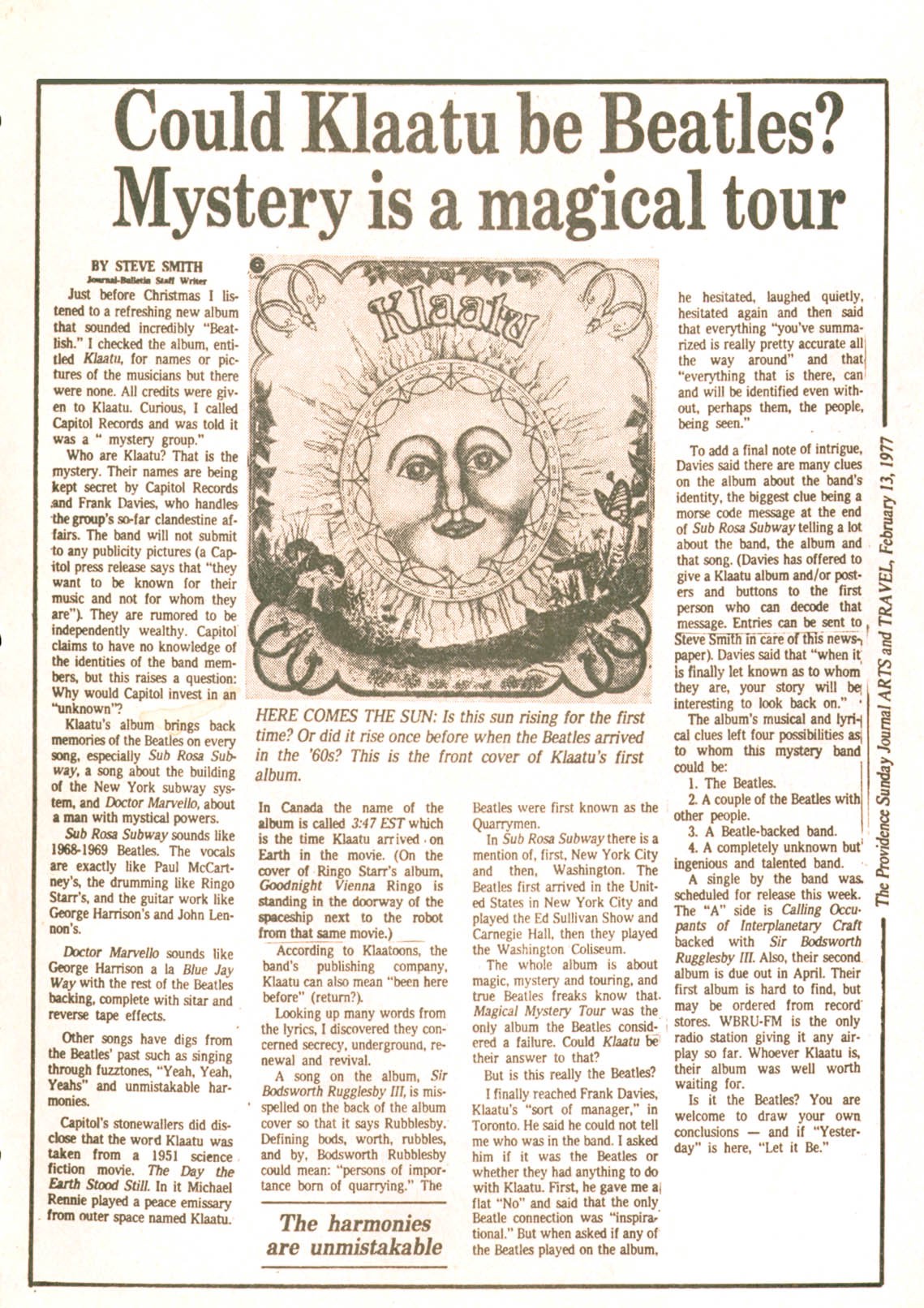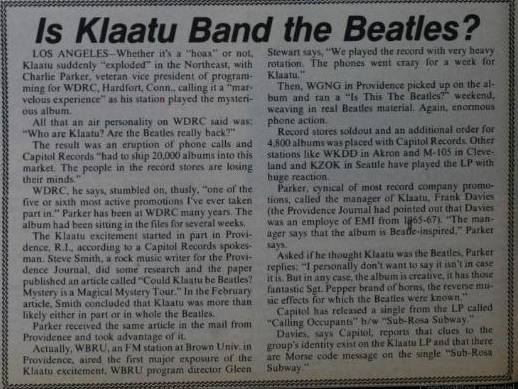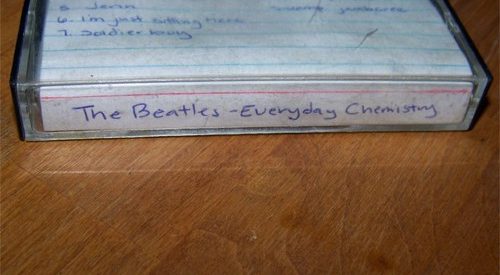On September, 9, 2009, a man calling himself James Richards claims he travelled to another dimension. There, the ketchup was purple and the Beatles were still together.

?I came into the possession of a cassette tape containing a Beatles album that was never released.? ? James Richards
James Richards is a man in hiding. That is to say, he?s seemingly impossible to track down. His website gives away no clue to his real identity (Richards being an alias), and his email address can only be traced back to the headquarters of a Yahoo.com subsidiary. So, why all the secrecy? What did he do to warrant an existence of such subterfuge and evasion? It seems the most accurate description of his crime, according to his own recounting, would be trans-dimensional theft.
His story starts in an isolated patch of Californian desert called Del Puerto Canyon. Photos on his website show an arid, baron bowl of a landscape circumscribed by imposing, jagged mountain ranges. It is, to be blunt, the arse-end of nowhere in a way that only the American West can pull off. It was here, Richards claims, that while in hot pursuit of his runaway dog, he tripped and knocked himself unconscious, kick-starting the most amazing experience of his life.
? Now this is where the story becomes slightly more unbelievable?
When he came to he found himself in an unfamiliar room, containing numerous commonplace household furnishings as well as a strange and otherworldly electronic machine. Outside he could hear the hum of traffic, a sound unfamiliar to the lifeless expanses of Del Puerto. Richards soon discovered the room belonged to a man named Jonas. Jonas, it turned out, was from a parallel dimension.
The account on Richards? website goes on to explain the concept behind this rather unusual occurrence as a kind of trans-dimensional tourism. You’ve probably not heard of that, as it doesn’t exist here, only in the other here. Think a Club 18-30 holiday, but instead of ending up in Magaluf you find yourself in an alternate reality. And instead of suffering the leg-room deficiency of a budget airline, you face the prospect of teleporting straight over a cliff edge. Or onto a train track. Or into a gigantic IKEA. This horror aside, existence-hopping is a fairly commonplace pastime for the residents of earth, claims Richards. The other earth that is. And it was during one of these trips that Jonas stumbled across the felled dog-walker, and decided to take him back to his own universe so he could bandage his head.

In an increasingly unbelievable recollection Richards goes on to describe the intricacies of this alternate dimension?a collection of Sci-Fi tropes that, when boiled down, can be summarised by two earth-shattering differences between this world and ours: firstly, the ketchup there is purple. Secondly, The Beatles are still together. This, he testifies, is how he happened upon, and stole from the bedroom of his rescuer, the Beatles album that never existed?Everyday Chemistry.

The problem with trying to debunk a story about a parallel universe is that it is, in its very nature, impossible. No matter how bold the claims, and no matter how clichd the storytelling, there is no surefire way to disprove any of the above. What?s more, the proof Richards supposedly brought back with him is there for all to see, or, more precisely, hear. All eleven tracks of the non-existent album are available online. And perhaps even stranger than the discoloured condiments of an alternate existence, is the fact that they?re actually pretty decent.
Sick to Death ? Everyday Chemistry
Soon after the album was leaked in 2009, the keen-eared fans of cyberspace noticed that each track contains several different elements of the Fab Four?s various solo projects, mixed together with some apparently original instrumentation. The album title would appear to be a clever nod to this, but Richards, when interviewed by the Telegraph, had a typically alternative explanation:
?I had a feeling some of the songs had a familiar sound to them as well. The only conclusion I can come up with is even though in the alternate universe The Beatles hadn’t broken up, that didn’t mean their future music ideas disappeared.?
Assuming inter-dimensional travel probably isn’t the exact truth behind this story, the question remains; who made the album? And why the shroud of secrecy? Is it just an overzealous copyright dodge or is there more going on here?
In 1998, a decade or so before Richards? website went live, the science-fiction writer Stephen Baxter published a story in a periodical called Interzone. The story was title called The Twelfth Album, and details an alternative reality in which a lost Beatles LP is discovered.The fictional record features songs that were, in the real world, written and recorded as solo projects. However in this narrative parallel universe, the group never disbanded. I email Baxter?s agent but am met with the news the writer is seemingly not interested in talking about otherworldly musical theft. I assume this means he probably wouldn?t be interested in perpetrating a gigantic interdimensional hoax either.
I also contact the Music Time Academy based in Livermore, CA?the city Richards claims to be from. I reason that as the biggest musical institute in the surrounding area, someone there may remember this story. Maybe it was a student project? Perhaps a pet pastime of one of the lecturers? The receptionist who answers my email makes a joking reference to the Lawrence Livermore National Laboratory, a federal nuclear research facility based nearby, that probably doesn’t deal in cross-dimensional package holidays. She also forwards my email to the faculty, but the trail, for now, ends there.
At a loss I reach out to Shane Richmond, the Telegraph writer who first covered the story in 2009. He replies, ? By weird coincidence, you have the exact same name as my uncle,? and I decide the best course of action is to have lie-down, before I convince myself that in another dimension I am his uncle.

Sifting through numerous dead-ends I find myself back at Richards? site. Something in the opening paragraph catches my eye.
?I came into the possession of a cassette tape containing a Beatles album that was never released. In fact, not only was it never released but it was recorded many years after they broke up (and no I?m not talking about Klaatu).?
I discover that Klaatu was a band made up of studio musicians from Canada who, in 1976, inadvertently found themselves playing their own part in The Beatles? legend.
Their drummer, Terry Draper, talks to me from his lake-side home a few miles outside of Toronto; a property he was able to buy, in part, thanks to a spurious piece of journalism by an employee at The Providence Journal.
The story goes that in August of that year Klaatu released their debut album, ?3.47 EST?. The record?s artwork contained no pictures of the band and no writing credits. It was a completely anonymous work, which quickly became synonymous with the most famous band in the world.
?Our mandate was to let the music speak for itself,? Draper tells me. ?It?s not about who plays the drums or who does the vocals, it?s all about the finished product and the records were made with that in mind.?
In this case the finished product, an album that had already met with positive reviews for its Beatles-cum-Beach Boys style arrangements, ended up in the offices of the Rhode Island newspaper, where an employee named Steve Smith took it home. Smith attempted to find out who was responsible for the music, but found that Capitol Records were unwilling to release the names. With his curiosity spiked he conducted some research, put one and one together, and came up with four ? a very famous four. He went on to publish an article suggesting that Klaatu was in fact The Beatles.
?At the time we were in England recording the London Philharmonic Orchestra on our second album,? Draper recalls. ?We just thought, ?well, that?s kind of interesting. Let?s get back to work now.? It was just an aside.?
What started as an aside didn’t stay that way for long, however. ?That headline went around the world and we started selling around 20,000 records a day in the U.S. It was quite outrageous. We got back to Toronto in early March and I knew that there was going to be some fallout.?
Looking back over Smith?s article it?s difficult to pinpoint exactly how the story gained traction. It contains the kind of wild speculation that can be found in any other piece of conspiratorial literature on The Beatles. He mentions that the word ?Klaatu? can mean ?been here before?, discusses uses of ?secrecy?, ?underground?, ?renewal?, and ?revival? in the album?s lyrics, and even makes claim that the record contains thematic elements related to ?magic?, ?mystery?, and ?touring?. Later articles released by factions of the media would allow this speculation to snowball, with increasingly bizarre theories being put forward by those desperate to believe.


?You have to understand that everybody, including me, wanted The Beatles to get back together in the early 70s,? continues Draper. ?It was part of the public consciousness. And so when somebody suggested it was possible?I mean, I watched Ed Sullivan that night in 1964 along with the rest of the world when I was a twelve year old boy, and I decided then and there to learn to play the drums. Their power cannot be overstated.
?There?s other songs on our first album that sound more like Pink Floyd to me, and other songs that sound nothing like the Beatles. But, the public believes what it wants to believe, and there?s no getting around it.?
Years later the band members would discover that Steve Smith wasn’t even a journalist. This, it happens, was the only article he ever published.

For a brief time Klaatu found itself in the crosshairs of the world?s music press, with a little help from a record company eager to cash-in on the speculation.
?Capitol Records took out full-page ads in Billboard,? Draper tells me. ?Instead of disclaiming the rumour and saying ?Klaatu is not The Beatles? the full-page ads said, ?Klaatu is Klaatu.? He laughs at this. ?It was throwing gasoline on the fire if you will.?
Eventually the truth came out, and, as with all legends, the public found the reality behind the band less intriguing that the fanfare that had introduced them. Almost forty years on Terry Draper looks back on the events of that year as the ?Damocles sword? of his career.
?Without it, most people wouldn’t know what Klaatu was or heard any of our music. On the other hand, when the media found out we weren’t The Beatles, just three knuckleheads from Toronto, they stopped playing our records?every one sold successively less than its predecessor.
?The media thought that we had perpetrated that rumour and tried to fool the people, like Millie Vanilli, or whatever those guys were called that never sang on their records. We did not do that, we were victims of this entire enterprise.?
After album number five Klaatu disbanded, without ever having repeated the commercial success of their debut effort.
https://www.youtube.com/watch?v=tiRUOzJ-FrE
?What?s odd to me,? muses Draper, ?is that we were good enough for an album to be recognised as possibly The Beatles reincarnate, and yet we?re not good enough a few years later to continue and have a career in this business.
?We recorded five albums and we?re quite proud of them. I know what we accomplished, and that?s a good thing. So, life goes on and you take what you get?sometimes a weed and sometimes a rose.?
In the ?rose? category, Terry and the other members of Klaatu can count a gold selling album in both Canada and Australia, one of the greatest water-cooler stories of all-time, and the knowledge that once upon a time the whole world heard their music, and thought they might be The Beatles.
Links:
You can listen to the whole of Klaatu?s brilliant debut LP here:
You can read more about James Richards? claims and hear all the tracks from Everyday Chemistry here:
www.thebeatlesneverbrokeup.com
Special thanks to Terry Draper: http://www.terrydraper.com/


